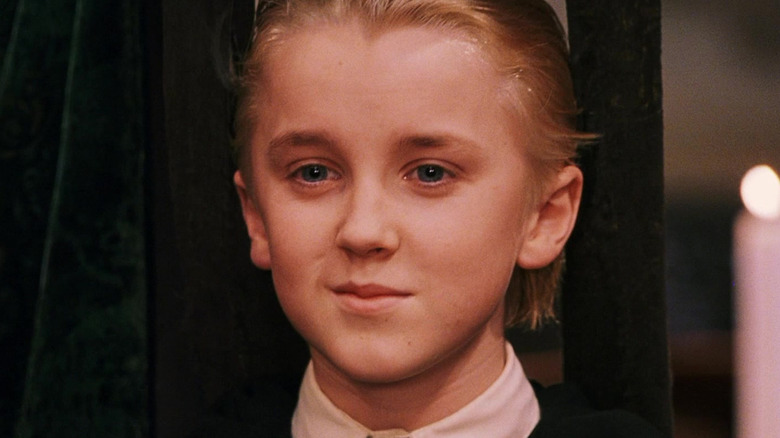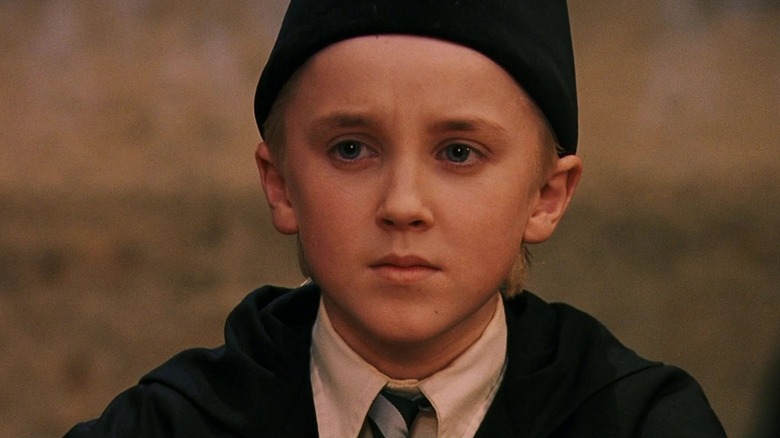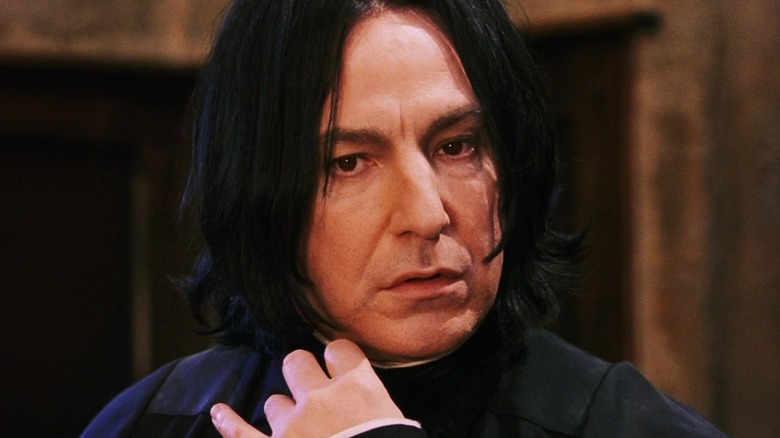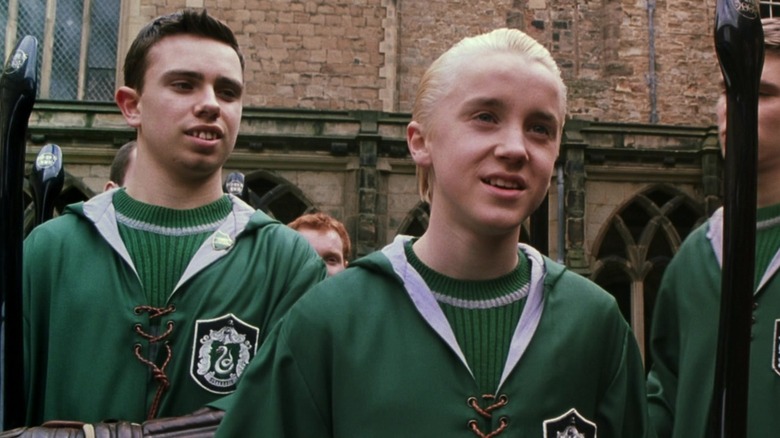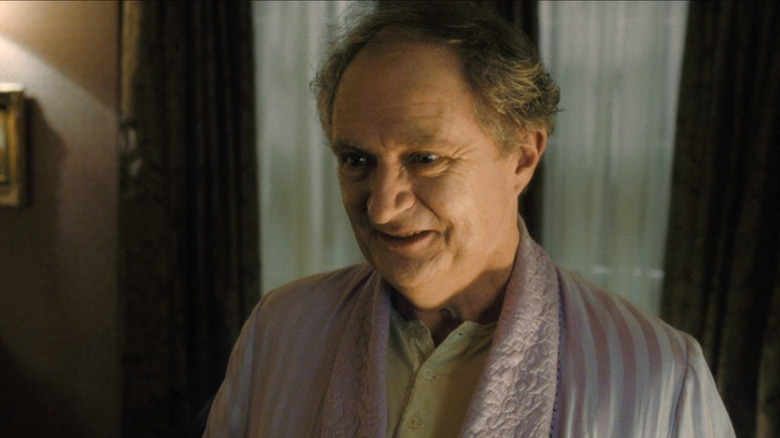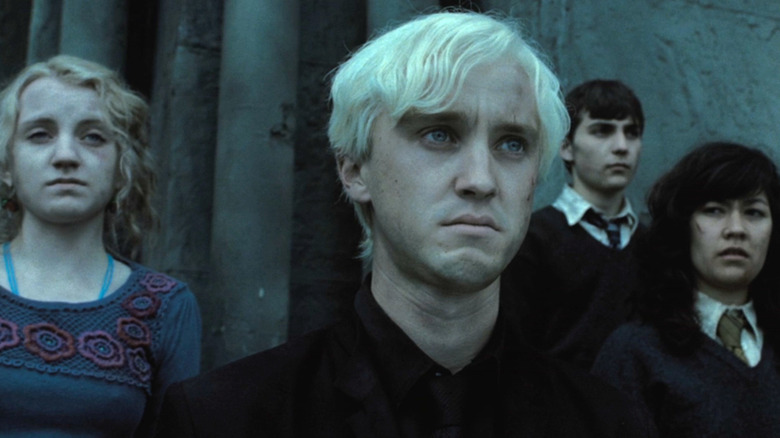Harry Potter's Slytherin Traits, Explained
One underrated aspect of the "Harry Potter" franchise is that, as much as Hogwarts is a magical place that so many kids would love to attend, it's also a parody of old-fashioned British boarding schools. There have been (and still are) plenty of those types of schools in the real world, complete with a reputation for having a privileged, somewhat smarmy student body. In the "Harry Potter" books and movies, you can see that stereotypically horrible boarding school behavior with the Slytherin house; its students are portrayed as a bunch of old-money bigots, often believing (usually correctly) that they can get away with anything.
The "Harry Potter" property ups the ante by not just having the Slytherins be annoying rich jerks, but by also having the apparent majority of them be supporters of Lord Voldemort, the wizard equivalent of Adolf Hitler. The Slytherins are so terrible that by the final "Harry Potter" book, when the school's preparing to fight off Voldemort's army in one big battle, the Slytherin students refuse to join in. The ones that do stay do so on Voldemort's behalf, not the school's.
So, how'd this happen? Nobody expected the Wizarding World to be perfect, but surely it wasn't so far gone that its central wizarding school would foster an openly evil house of students for generations on end. Are the Slytherins really this terrible? Or is there an unreliable narrator situation going on here?
What are the common traits of a Slytherin student?
In the first "Harry Potter" book, readers are treated to a song from the Sorting Hat describing all the houses at Hogwarts. The hat takes up a charitable tone in its various descriptions, but it's immediately clear that one of these houses is not like the others. "In Slytherin, you'll make your real friends," the Sorting Hat says, "Those cunning folk use any means to achieve their ends."
This isn't really a compliment, though, is it? Throughout the books, the most positive trait ascribed to Slytherins is that they're "ambitious," even though this is an adjective that's neutral at best. Gryffindors are described as being brave, Ravenclaws as smart, and Hufflepuffs as kind and loyal; describing Slytherin as "cunning" and "ambitious" sure seems like a red flag in comparison. It doesn't even appear to be true, either. Have Slytherin students like Crabbe or Goyle ever come across as ambitious to anyone?
The other key trait of a Slytherin student is that they have pure blood, which means both their parents are from wizard families. Although muggle-born students do supposedly end up in Slytherin from time to time, it's a rare occurrence, especially since a lot of Slytherins (particularly Harry's rival Draco Malfoy) show a clear disdain toward their muggle-born peers. There's even a slur for them ("mudbloods") that only Slytherins seem to enjoy throwing around. And while being a racist isn't considered a key trait of being Slytherin (the Sorting Hat certainly never mentions it), it certianly appear to be a major unofficial characteristic.
Why are Slytherins considered so evil?
In addition to being power-hungry and racist, the biggest PR loss for Slytherin throughout the "Harry Potter" franchise is that the dark wizard who killed Harry's parents, Voldemort himself, was once a Slytherin student. Most of Voldemort's followers are Slytherins too, and many of the named Slytherin students we meet throughout the property have parents who are devoted to the Dark Lord's cause.
Draco, the most prominent Slytherin student, is even the son of one of Voldemort's most prominent followers. Most of the "Harry Potter" books and movies depict him in an unflattering light as well, whether he's reveling in his fellow students being terrorized by a mysterious creature or laughing as Voldemort's followers torment a poor muggle family. He's eventually given some depth in "Harry Potter and the Half-Blood Prince," but throughout the five books and films leading up to that, he's the embodiment of every terrible stereotype people believe about his house.
The other prominent Slytherin character in the franchise is Severus Snape, the potions professor who spends the first six books and movies bullying a bunch of kids on a daily basis. Snape is eventually revealed to be working for the side of good, but that doesn't quite explain why he's so horrible to so many of his students. Even outside his abuse of children, we see in flashbacks that he used to be a devout follower of Voldemort; he didn't switch sides because he found a moral backbone, but because Voldemort killed Harry's mother Lily, the source of Snape's unrequited love. If Voldemort had murdered some other poor woman in Lily's place, it's unlikely Snape would've cared.
Should the Slytherin house be disbanded?
In today's digital age, the most obvious real-life parallel to the Slytherin house are the online echo chambers that throw people down alt-right pipelines. Hogwarts' house system is throwing all the bad kids into a single house, socially isolating them from any of the good kids who might challenge their worldviews or encourage them to be better. Not only that, but the Slytherin kids who aren't racist or evil also appear to be quickly pushed in that direction by the Slytherins who are.
It seems like the smart choice for Hogwarts, especially after Voldemort returned for yet another reign of terror, would be to disband the Slytherin house and disperse their students into the other three houses. Instead of being surrounded by the school's most evil students, the would-be Slytherins would instead be surrounded by a healthy mix of personality types. This would both help these students grow and mature, and it would erase most of the bad vibes around the school.
Unfortunately, there are structural reasons for why this doesn't happen in any of the books or movies. The Slytherins are the richest house at Hogwarts and they seem to have no shortage of powerful families connected to the Ministry; to disband the house, you'd have to get through them first. Then there's the whole issue of the Wizarding World being remarkably complacent. Even Hogwarts' headmaster Dumbledore, the closest thing the "Harry Potter" franchise has to a clear voice-of-reason character, is comfortable with the constant dysfunction going on at his school. He's willing to question the school's sorting system — musing at one point that perhaps Hogwarts sorts the kids too early — but he never goes as far as to question whether Slytherin should even exist at all.
The characters in these stories seem largely unable to imagine a better world for themselves or seriously rethink the structures of their current society. Out of all the characters, only Harry's pal Hermione seeks to change things radically for the better, and that doesn't exactly go well for her.
What does JK Rowling think about the Slytherin house?
"They're not all bad," as "Harry Potter" author JK Rowling explained in a 2008 interview with PotterCast. "And, well, far from it. As we know, at the end, they may have [laughs] a slightly more highly developed sense of self-preservation than other people. [...] It's the old saying, 'There is no truth, there are only points of view."
In the same interview, she clarified that some of the Slytherins had actually returned for the battle at Hogwarts; they'd simply left to get reinforcements and then come back to help. However, there's no mention of this in the final "Harry Potter" book and certainly no mention of it in the movie adaptation. It doesn't help the Slytherins' case that the most heroic thing they've ever done was something only ever mentioned offhand by the franchise's creator in an interview. If you subscribe to the whole "Death of the Author" theory of media criticism (which is pretty much a necessity for modern "Harry Potter" fans), then this explanation doesn't hold much weight.
The clearest bit of evidence that Rowling didn't intend for the Slytherins to be evil is with the character of Professor Slughorn, who is introduced in the sixth book as the school's new potions professor. Slughorn is a coward, an elitist, and he hold some casual prejudice towards muggle-born students, but to his credit, he does fight Voldemort's forces in the final battle at Hogwarts and never once seems sympathetic to Voldemort's ideology. There are also some minor Slytherin characters who are occasionally implied to dislike Malfoy or Voldemort, although none of them are fleshed out enough to make any impression.
How will the Harry Potter show handle the Slytherin house?
If there's one benefit to the controversial "Harry Potter" TV series reboot, it's that its medium will offer the series the chance to flesh out all those Slytherin students. Maybe the TV version of Draco will be slightly less of an evil brat for his first five years of school, and maybe Snape won't be, say, casually threatening to murder students' pets. Perhaps we'll even get to see a few Slytherins befriend Harry and the gang at some point or turn up at the battle at Hogwarts (assuming the show lasts that long).
Of the main Slytherin characters, Draco's definitely got the most room for improvement here. He's a character who seems like he's getting a redemption arc in the final two books (or final three movies), but fans had to settle for half of one. By the end of the story, Draco sure seems disillusioned with Voldemort's deal, but he still doesn't do much to make up for an entire childhood of being the absolute worst. Perhaps there's an opportunity here for the books to flesh Draco out a little earlier than his "Half-Blood Prince" arc; maybe he grows more complicated as early as seasons 4 or 5, so that when season 7 comes along, we can more easily buy a more triumphant, redemptive conclusion (again, in the event the series reaches that point).
It's also possible that the show will double down on the Slytherins being awful and use that as a justification to dismantle the house at the end of the final season. After over 25 years of the "Harry Potter" franchise ignoring the elephant in the room, perhaps this is the time for it to take a stand and say that Slytherin has to go. Either the TV show can make the Slytherins more nuanced or it can dismantle their house entirely; both could be compelling directions for the series to take. It's only the middle-of-the-road, status quo-affirming approach that would be a true disappointment. The TV reboot has the chance to shake things up a bit, so let's hope it takes advantage.
